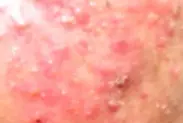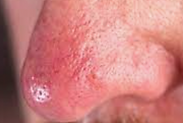As Featured in

















What is Rosacea?
Rosacea is a chronic inflammatory skin condition that primarily affects the central areas of the face, including the cheeks, nose, chin, and forehead.
It typically develops in adults and may present with various symptoms.
Analysing your Rosacea Condition
Erythematotelangiectatic Rosacea (ETR)

The face becomes red, and there is dilation of capillaries. There is also a sensation of warmth and stinging.
Acne Rosacea

Red bumps and pus-filled pimples similar to acne are present. There is also a sensation of warmth and stinging.
Ocular Rosacea

There is redness in the eyes, a sensation of a foreign body, itching, dryness, and sensitivity to light.
Rhinophyma

There is the formation of nodules centered around the nose.
Common Rosacea Symptoms
Persistent Redness
Ongoing redness across the cheeks, nose, or forehead.

Bumps & Pimples
Small red bumps or acne-like lesions in inflamed areas.

Pus-Filled Bumps
Pus-filled, acne-like bumps needing distinct care.

Visible Blood Vessels
Dilated capillaries that appear as red lines on the skin.







Who May Benefit
from Rosacea Treatment?
・Persistent facial redness
・Visible blood vessels
・Inflammatory lesions
・Increased skin sensitivity
・Eye symptoms related to rosacea

Individuals Experiencing:

・Professional evaluation and diagnosis
・Evidence-based management approaches
・Guidance on trigger management
・Appropriate skincare recommendations
Those Seeking:

・Has identified triggers but needs professional guidance
・Has tried over-the-counter approaches without adequate improvement
・Wants to prevent progression of symptoms
・Seeks comprehensive, medically-supervised care
Anyone Who:
What causes Rosacea?
While the exact cause of rosacea is not fully understood, current research suggests it may result from a combination of multiple factors:

Some studies suggest that individuals with a family history of rosacea may be more susceptible to developing the condition. However, having a family history does not guarantee development of rosacea.
Genetic Factors
01

People with rosacea may have differences in blood vessel function, which could contribute to flushing and persistent redness.
Vascular Factors
02

The immune response in rosacea-prone skin may differ from normal skin, potentially contributing to inflammation and sensitivity.
Immune System Factors
03

Changes in skin barrier function may allow increased water loss and make skin more susceptible to irritants and environmental factors.
Skin Barrier Factors
04

Various factors may trigger or worsen rosacea symptoms in susceptible individuals:
Environmental and Lifestyle Triggers






Sun exposure and heat

Spicy foods and hot beverages

Alcohol consumption

Emotional stress
05
Extreme temperatures
Strenuous exercise
Hot baths or saunas
Certain medications
Harsh skincare products containing alcohol, fragrances, or strong exfoliants
How is Rosacea related to
Microbiome health?

The skin microbiome refers to the community of microorganisms that naturally reside on the skin’s surface. A balanced microbiome is thought to support overall skin health, including barrier function and inflammatory regulation. In individuals with rosacea, research suggests that changes in microbiome composition may be associated with skin sensitivity, redness, or inflammation.
Disruptions in the skin microbiome—such as an overgrowth of certain bacteria—are believed to influence how the skin reacts to environmental or internal triggers. While the exact relationship between microbiome health and rosacea is still being studied, maintaining a healthy skin environment through microbiome-friendly skincare and medical guidance may help reduce flare-ups and support symptom management.
Several factors related to microbiome imbalance may influence rosacea symptoms. Below are some examples that may contribute to increased skin sensitivity or flare-ups.
In summary, the skin microbiome is increasingly recognised as a factor in rosacea-related skin changes. Supporting microbial balance through personalised skincare, medical consultation, and avoidance of known triggers may contribute to more effective long-term management of rosacea.
Rosacea vs. Acne:
Understanding the Difference
Differentiate | Rosacea | Acne |
|---|---|---|
Location | Face, mostly on the cheeks | Various parts of the body, including the face, chest, shoulders, and back. |
Age | Mainly Adults, aged 30-50 years old | Teens - Adults |
Triggers | Spicy foods, alcohol, sunlight, stress, and hot beverages. | Fluctuations in hormonal changes |
Type of bumps | Small, red, pus-filled bumps that resemble acne. | Blackheads, whiteheads, pustules, papules, nodules and cysts |
Appearance | Redness and visible blood vessels on the face, especially on the cheeks, nose, forehead, and chin. | Visible Blackheads and Whiteheads |

How Doctors
Treat Rosacea:
A Medical Approach
At KINS Clinic, we offer evidence-based treatment options. Your personalized plan may include one or several approaches, depending on your individual presentation.
Option
1
Laser therapy may be used to address the vascular symptoms of rosacea, including persistent redness and visible blood vessels.
At KINS Clinic, we use HSA-approved laser technology specifically designed for treating vascular skin conditions.
Laser Treatment

Pulsed Dye Laser (PDL) / Vascular Laser (VBeam)
Vbeam laser therapy is a highly effective treatment for rosacea. This technology uses a targeted laser to specifically target the blood vessels causing redness and visible veins on the skin. By delivering precise bursts of light energy, the Vbeam laser shrinks the blood vessels, reducing redness and improving overall skin tone.
The treatment is non-invasive, relatively painless, and requires minimal downtime. It's particularly beneficial for individuals with rosacea as it significantly reduces the prominent facial redness and visible blood vessels associated with the condition, restoring a more even complexion and boosting self-confidence. Multiple sessions may be needed for optimal results, but Vbeam laser therapy offers a safe and efficient solution for managing rosacea symptoms.
First trial: $288
There are several topical medications with anti-inflammatory properties that may be effective for treating the bumps (papules and pustules) and inflammation associated with rosacea. Since the effectiveness of these treatments can vary depending on the symptoms—and some may not be suitable for certain skin types—it’s best to consult with a doctor and use them under medical guidance.
Topicals

Note: These should only be used under medical supervision.
Option
2
Azelaic acid is a topical medication with both anti-inflammatory and antimicrobial properties. It may help reduce inflammatory lesions and redness associated with rosacea. This medication is generally well-tolerated by most patients, though results typically take several weeks to become noticeable. Azelaic acid can be appropriate for various rosacea presentations and is often considered when multiple symptom types need to be addressed.
Azelaic Acid
Ivermectin is a topical treatment that may reduce Demodex mite populations while also providing anti-inflammatory effects. The dual mechanism of action makes it potentially beneficial for papulopustular presentations. Patients generally need several weeks of consistent use before noticing effects. Ivermectin is generally well-tolerated, though individual responses may vary.
Ivermectin
Metronidazole has been well-studied in rosacea management and possesses anti-inflammatory and antimicrobial properties. This topical treatment may help reduce inflammatory lesions over time. Patients typically need to use metronidazole for several weeks before observing improvement. This medication is often considered appropriate for inflammatory presentations of rosacea.
Metronidazole
In carefully selected cases, retinoids may be used cautiously as part of rosacea management. These medications require gradual introduction to minimize potential irritation, as they can initially cause dryness and sensitivity in rosacea-prone skin. Your doctor will carefully evaluate whether retinoid therapy is appropriate for your specific situation, considering your skin's tolerance and overall treatment plan.
Retinoids
For certain rosacea presentations, particularly those that are moderate to severe or have not responded adequately to topical treatments alone, oral medications may be recommended as part of your management plan.
Oral

Note: These should only be used under medical supervision.
Option
3
Oral antibiotics are often prescribed for rosacea with acne-like breakouts. They work quickly to reduce inflammation, and many patients see visible improvement within a few weeks. In some cases, a low-dose maintenance plan may be recommended to help keep symptoms under control.
Antibiotics
Isotretinoin is a powerful oral medication used for severe acne and inflammatory rosacea. It helps reduce redness and inflammation by controlling oil production in the skin. Due to its potential side effects, it is only prescribed under strict medical supervision.
Isotretinoin
Option
Biostimulator treatment focuses on improving the overall quality and resilience of rosacea-prone skin by supporting its natural barrier function.
At KINS Clinic, we use a PN-based biostimulator formulation designed to encourage skin repair and restore long-term balance — offering a scientifically backed complement to medical rosacea management.
Biostimulator Treatment

PN-based Biostimulator Injection
This medical-grade treatment uses polynucleotides (PNs) — purified DNA fragments that support skin regeneration and hydration.
Delivered through microinjections into the superficial dermis, it helps repair tissue and improve overall skin quality.
For rosacea-prone skin, PN-based biostimulation supports barrier recovery and strengthens tolerance to external triggers such as heat, dryness, and cosmetic irritation.
By enhancing baseline resilience, it helps stabilise skin condition, reduce flare frequency, and complement other medical treatments — promoting healthier, more balanced skin over time.
Minimally invasive and performed under medical supervision, it offers a safe and effective adjunct to rosacea care.
First trial: $750
4
Your daily skincare routine can significantly impact rosacea management, either supporting your treatment efforts or inadvertently worsening symptoms. We provide detailed guidance on building an appropriate routine that works with your skin rather than against it.
Skin Care

Option
5
Microbiome Repair Therapy
Developed by our microbiome experts in Japan, this skincare supports skin recovery from rosacea by restoring balance to the skin microbiome. It strengthens the skin barrier, calms redness, prevents harmful bacteria, retains moisture, and promotes long-term skin health.
Your Rosacea Management
Journey at KINS Clinic

Step 1: Booking & Preparation
A smooth start from the comfort of your home. To ensure we have ample time for your evaluation, we operate on a strictly by-appointment basis. After booking, you will receive a secure Pre-Registration Form via email. Filling this out beforehand helps us prepare for your visit. (Note: Please bring your IC card or Passport for identity verification.)
Step 2: Skin Imaging & Assessment
Establishing your baseline. Before the consultation, we take high-definition clinical photos of your skin. This is crucial for rosacea management, as it allows us to objectively track changes in redness and vascularity over time. We also assess your skin barrier function to understand your skin's current sensitivity levels. (Photos are taken on bare skin; we can assist with gentle makeup removal.)


Step 3: Comprehensive Consultation (30 mins)
A deep dive into your skin and lifestyle. Your doctor will review your complete medical history, including previous treatments, family history, and current medications. We go beyond just looking at your skin. We evaluate:
-
Rosacea Type & Severity: Identifying your specific subtype.
-
Eye Involvement: Checking for ocular rosacea (dryness or irritation).
-
Triggers: Discussing lifestyle factors, stress, and daily routines that may cause flare-ups.
Your Personalized Management Plan: Based on this evaluation, we develop a plan tailored to your needs. This may include prescription medications, skincare modifications, or laser treatments. We believe in transparency regarding expected results, costs, and risks.
Step 4: Treatment Implementation
Gradual, guided care. You can often start your treatment on the same day.
-
Medications: If prescribed topical or oral medications, we provide clear instructions. We introduce them gradually to minimize potential irritation and monitor your tolerability.
-
Laser Treatments: If recommended, sessions typically last 15 to 30 minutes. We provide pre- and post-treatment guidance to ensure optimal outcomes and minimize downtime.


Step 5: Long-Term Maintenance & Support
Sustaining your results. Rosacea is a condition that requires ongoing management to prevent "flare-ups."
-
Follow-Up: Your first review is typically in 4–6 weeks. We adjust the plan based on your response.
-
Maintenance: Once stable, we shift to a maintenance protocol to keep your skin calm.
-
Home Support: If you have questions about your routine or notice sudden changes, simply message us on WhatsApp. We are here to support your journey towards long-term skin health.
Why choose KINS Clinic

Doctor-Led Laser Treatment
Vascular lasers safely target redness
— available only under medical care.

Microbiome-
Supportive Approach
Treatments support healthy skin balance and reduce flare-ups.

Science-Based,
Custom Plans
We customise each plan using science-backed methods.

Extensive Experience
30+ years treating various sensitive skin types.

Long-Term Results
We treat the root cause, not just the symptoms.

Safety and
Effectiveness
Gentle care for Asian and sensitive skin types.
Meet Your Rosacea Care Doctor

At KINS Clinic, all rosacea assessments and treatments are performed by MOH-certified medical doctors.
Our doctor will take time to understand your symptoms, assess your skin condition, and explain tailored treatment options.
We focus on providing clear guidance, science-backed solutions, and a treatment journey built around your needs.
One-on-One Doctor Consultation
Tailored Treatment Plan for Your Skin
Vbeam Laser & Medical-Grade Skincare Options
No-pressure, Honest Advice

Dermatologist and Chief Medical Advisor
Fellows of the Academy of Medicine, Singapore (FAMS) / Membership of the Royal Colleges of Physicians (MRCP) / Bachelor of Medicine and Bachelor of Surgery (BMBS)
Prior to joining KINS Clinic, Dr. Henry Loh was a co- founding partner of Dermatology Associates, one of the largest private dermatology clinic groups in Singapore. He has also been instrumental in promoting the use of the latest treatments.

Medical Director and Consultant
Post-graduate Diploma in Practical Dermatology (PgDip) / Doctor of Medicine (MD) / Bachelor of Medical Studies (BMed) / Bachelor of Science in Medicine (BSc (Med))
Dr Silver Chua specialises in the medical care of acne, rosacea, and other common skin concerns, complemented by a strong background in aesthetic treatments. She leads the fully integrated care pathway at KINS Clinic—ensuring patients receive cohesive, evidence-based care that bridges both medical and aesthetic needs. Her approach is grounded in safety, with a strong emphasis on achieving naturally balanced, lasting results.
Dr Silver is fluent in both English and Mandarin














